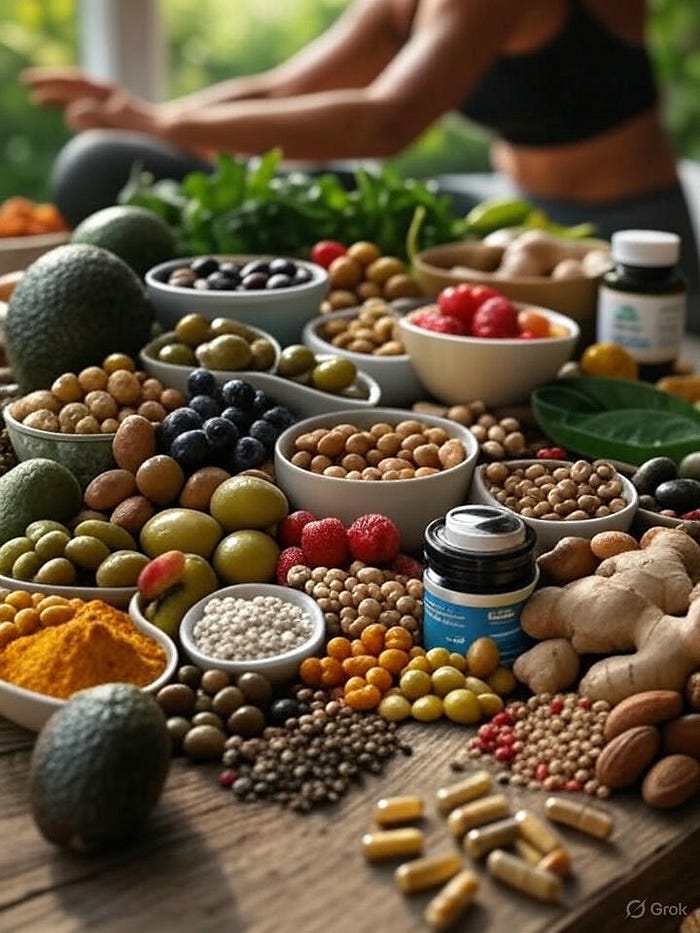Struggling with joint pain can feel limiting, but a thoughtfully crafted plant-based diet, combined with the right supplements, can help soothe discomfort and promote joint vitality. Whether you’re managing arthritis, stiffness, or occasional aches, these nutrient-packed foods and supplements can support your journey to better mobility. Here’s a fresh guide from Gurtrition to plant-based solutions that keep you active and energized.

Plant-Based Foods to Ease Joint Pain
Avocados and Olives
These nutrient-dense fruits are brimming with healthy monounsaturated fats that help calm inflammation in the body, potentially reducing joint soreness and improving flexibility.
- How to Use: Mash avocado onto whole-grain bread, blend into creamy smoothies, or drizzle extra virgin olive oil over roasted veggies.
- Pro Tip: Choose cold-pressed olive oil to retain its anti-inflammatory compounds.
Dark Leafy Greens (Kale, Arugula, Collards)
Packed with vitamins A, C, and K, these greens are antioxidant powerhouses that help neutralize inflammation-causing free radicals. They also deliver magnesium to support joint and muscle function.
- How to Use: Toss into fresh salads, steam with a splash of lemon, or blend into green smoothies.
- Pro Tip: Pair with foods high in vitamin C, like bell peppers, to boost nutrient uptake.
Colorful Berries (Blackberries, Cherries, Blueberries)
Berries are bursting with polyphenols, natural compounds that help reduce joint inflammation and protect cartilage from wear and tear.
- How to Use: Snack on them fresh, stir into yogurt, or freeze for a refreshing smoothie ingredient.
- Pro Tip: Opt for organic berries to avoid pesticide residues that may irritate inflammation.
Nuts and Seeds (Almonds, Hemp Seeds, Pumpkin Seeds)
These tiny powerhouses offer plant-based omega-3s, which can help reduce joint swelling, plus protein and fiber for overall wellness.
- How to Use: Sprinkle over oatmeal, blend into energy bars, or enjoy as a trail mix.
- Pro Tip: Soak almonds overnight for easier digestion and better nutrient absorption.
Ginger and Turmeric
These vibrant spices are natural anti-inflammatories. Ginger soothes joint stiffness, while turmeric’s curcumin helps curb pain and swelling.
- How to Use: Grate fresh ginger into teas or soups, or add turmeric to rice dishes or warm plant-based milk.
- Pro Tip: A pinch of black pepper with turmeric enhances its anti-inflammatory effects.
Beans and Lentils (Kidney Beans, Red Lentils, Pinto Beans)
These plant-based staples provide protein, fiber, and minerals like potassium, which support joint health and reduce inflammation.
- How to Use: Whip up a lentil soup, create bean-based tacos, or blend into creamy dips.
- Pro Tip: Rinse canned beans to reduce sodium and improve digestibility.
Plant-Based Supplements for Joint Wellness
Algae-Based Omega-3
Sourced from algae, this vegan alternative to fish oil delivers DHA and EPA, which help lubricate joints and reduce inflammation.
- Suggested Use: Take 500–1000 mg daily, as per product instructions.
- Pro Tip: Select a brand with transparent sourcing and third-party testing.
Curcumin Capsules
These provide a potent dose of turmeric’s active compound, offering stronger anti-inflammatory benefits than culinary turmeric alone.
- Suggested Use: 500–1500 mg daily, ideally with piperine to enhance absorption.
- Pro Tip: Choose capsules with at least 95% curcuminoids for maximum efficacy.
Vegan Glucosamine
Made from plant sources like corn, this supplement supports cartilage repair and may ease joint discomfort.
- Suggested Use: 1500 mg daily, often paired with MSM for added benefits.
- Pro Tip: Check for potential interactions with medications before starting.
Lichen-Derived Vitamin D3
Low vitamin D levels can worsen joint pain. Plant-based D3 from lichen helps maintain bone and joint health.
- Suggested Use: 2000–4000 IU daily, based on your needs and blood tests.
- Pro Tip: Take with a fatty meal to improve absorption.
MSM (Methylsulfonylmethane)
This sulfur-based compound supports connective tissue and may reduce joint pain and inflammation.
- Suggested Use: 1000–3000 mg daily, starting low to test tolerance.
- Pro Tip: Combine with vitamin C for synergistic joint support.
Lifestyle Tips for Healthier Joints
- Keep Hydrated: Drinking 8–10 cups of water daily helps lubricate joints and supports overall health.
- Move Your Body: Gentle exercises like tai chi, cycling, or stretching can enhance joint flexibility and strength.
- Avoid Inflammatory Triggers: Cut back on refined sugars, processed snacks, and trans fats to keep inflammation in check.
- Talk to a Professional: Always check with a healthcare provider before adding supplements, especially if you’re on medications or have health conditions.
Step Toward Pain-Free Living!
Embracing a plant-based approach with these foods and supplements can transform how your joints feel, helping you move with confidence and joy. Start by incorporating a few of these options into your daily routine and explore supplements to bridge any gaps. With patience and consistency, you’ll be on track for stronger, more comfortable joints!
Comments
Post a Comment